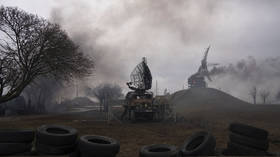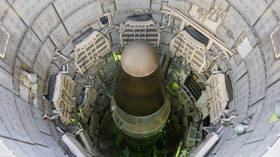Pentagon chief weighs in on Ukraine no-fly zone

US Defense Secretary Lloyd Austin has rejected any plan to impose a no-fly zone over Ukraine following pleas from officials in Kiev, saying it would inevitably kick off a hot conflict between nuclear powers.
Speaking to NBC’s Lester Holt for an interview aired on Wednesday, the Pentagon head agreed that a no-fly zone (NFZ) is a “non-starter” – a statement in line with the president’s pledge that American troops would not directly intervene in the conflict.
“President [Joe] Biden’s been clear that US troops won’t fight Russia in Ukraine, and if you establish a no-fly zone, certainly in order to enforce that no-fly zone, you’ll have to engage Russian aircraft. And again, that would put us at war with Russia,” Austin said.
In an exclusive interview with @LesterHoltNBC, Defense Secretary Lloyd Austin discusses where the U.S. stands on imposing a no-fly zone in Ukraine as Russia intensifies its assault.Tune in to @NBCNightlyNews at 6:30 pm ET / 5:30 pm CT for more (check local listings). pic.twitter.com/OIziOnG3fL
— NBC Nightly News with Lester Holt (@NBCNightlyNews) March 2, 2022
While Ukrainian President Volodymyr Zelensky called on the United States and NATO to take control of “significant parts” of his country’s airspace on Monday in order to disrupt Russian air operations, Washington has been reluctant to act on the request. During a briefing earlier this week, White House Press Secretary Jen Psaki also noted the risks associated with enforcing an NFZ.
“That is definitely escalating and would potentially put us in a place in a military conflict with Russia. That’s something the president doesn’t want to do,” she said.
British Prime Minister Boris Johnson has echoed that stance, saying that to get “involved actively in conflict with Russia is a huge step which is not being contemplated by any member” of the NATO alliance, and that an NFZ is “simply not on the agenda.”
Western states continue to ship in a flurry of arms to help Ukrainian forces repel Russia’s advance, including anti-aircraft Stinger missiles from the US and Germany – breaking with Berlin’s long-held policy to never send weapons into an active conflict zone – in addition to a litany of other anti-armor munitions and small arms from other European allies.
Moscow announced a “special military operation” in Ukraine last week on behalf of the Russian-speaking population of the newly recognized Donetsk and Lugansk Republics, launching strikes on military sites in a number of major cities while mobilizing a land invasion. While Russia says it aims to “demilitarize” and “denazify” the Ukrainian government, Kiev maintains the assault was entirely “unprovoked” and that it had no plans to retake the breakaway regions by force.













